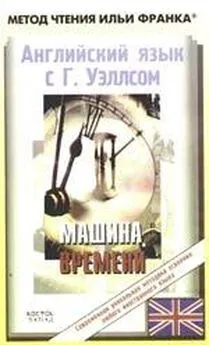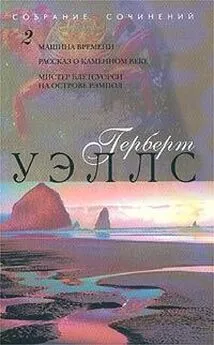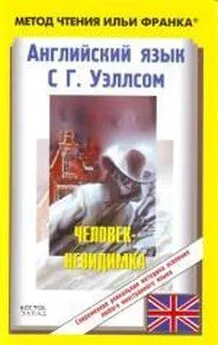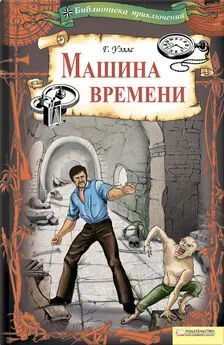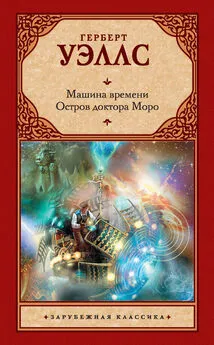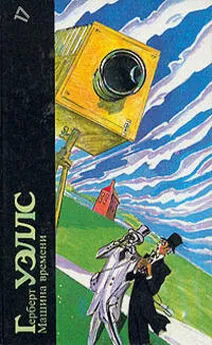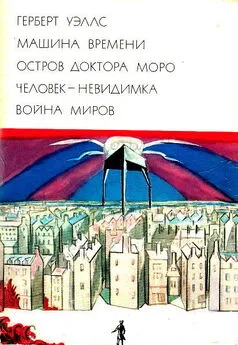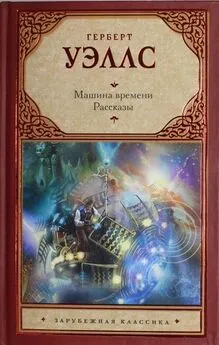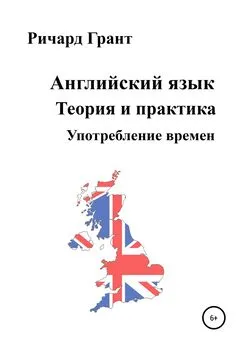H. Wells - Английский язык с Гербертом Уэллсом. Машина Времени
- Название:Английский язык с Гербертом Уэллсом. Машина Времени
- Автор:
- Жанр:
- Издательство:неизвестно
- Год:неизвестен
- ISBN:нет данных
- Рейтинг:
- Избранное:Добавить в избранное
-
Отзывы:
-
Ваша оценка:
H. Wells - Английский язык с Гербертом Уэллсом. Машина Времени краткое содержание
Английский язык с Гербертом Уэллсом. Машина Времени - читать онлайн бесплатно полную версию (весь текст целиком)
Интервал:
Закладка:
decadent [`dekqd(q)nt], endure [en`djuq], specimen [`spesImIn]
'I must confess that my satisfaction with my first theories of an automatic civilization and a decadent humanity did not long endure. Yet I could think of no other. Let me put my difficulties. The several big palaces I had explored were mere living places, great dining-halls and sleeping apartments. I could find no machinery, no appliances of any kind. Yet these people were clothed in pleasant fabrics that must at times need renewal, and their sandals, though undecorated, were fairly complex specimens of metalwork. Somehow such things must be made. And the little people displayed no vestige of a creative tendency. There were no shops, no workshops, no sign of importations among them. They spent all their time in playing gently, in bathing in the river, in making love in a half-playful fashion, in eating fruit and sleeping. I could not see how things were kept going.
'Then, again, about the Time Machine (и вот теперь происшествие с Машиной Времени): something, I knew not what, had taken it into the hollow pedestal of the White Sphinx (что-то, я не знал, что, забрало ее в полый пьедестал Белого Сфинкса). Why (зачем)? For the life of me I could not imagine (клянусь жизнью, я не мог представить). Those waterless wells, too, those flickering pillars (также эти безводные колодцы и столбы = башни с колеблющимся /над ними воздухом/). I felt I lacked a clue (я чувствовал, что не нахожу ключа/разгадки; tolack— испытывать недостаток; не хватать ). I felt—how shall I put it (я чувствовал — как бы это вам объяснить)? Suppose you found an inscription (представьте себе, что вы нашли надпись), with sentences here and there in excellent plain English (с фразами то тут, то там на отличном английском языке), and interpolated therewith (и при этом со вставками; tointerpolate— видоизменять, делая вставки /напр., в рукопись/; вставлять слова; therewith — с тем, с этим; к тому же ), others made up of words, of letters even, absolutely unknown to you (других слов или даже букв, абсолютно незнакомых вам)? Well, on the third day of my visit (на третий день моего пребывания), that was how the world of Eight Hundred and Two Thousand Seven Hundred and One presented itself to me (именно так мир восемьсот две тысячи семьсот первого года представлялся мне; to present oneself — представлятьсебя )!
pillar [`pIlq], excellent [`eks(q)l(q)nt], interpolate [In`tWpqleIt]
'Then, again, about the Time Machine: something, I knew not what, had taken it into the hollow pedestal of the White Sphinx. Why? For the life of me I could not imagine. Those waterless wells, too, those flickering pillars. I felt I lacked a clue. I felt—how shall I put it? Suppose you found an inscription, with sentences here and there in excellent plain English, and interpolated therewith, others made up of words, of letters even, absolutely unknown to you? Well, on the third day of my visit, that was how the world of Eight Hundred and Two Thousand Seven Hundred and One presented itself to me!
'That day, too, I made a friend—of a sort (в тот день я также приобрел друга — в некотором роде). It happened that, as I was watching some of the little people bathing in a shallow (это случилось, когда я смотрел на группу маленьких людей, купавшихся /в реке/ в неглубоком месте; shallow— мель, отмель ), one of them was seized with cramp and began drifting downstream (одну из них схватила судорога, и ее понесло по течению; todrift— относить ветром, течением ). The main current ran rather swiftly (основное течение пробегало здесь довольно быстро = было здесь довольно быстрое), but not too strongly for even a moderate swimmer (но не слишком сильное даже для среднего пловца). It will give you an idea, therefore, of the strange deficiency in these creatures (я дам вам представление о странном недостатке этих существ; deficiency— отсутствие чего-либо; недостаток, неполноценность, дефект ), when I tell you that none made the slightest attempt to rescue the weakly crying little thing (когда скажу, что никто не сделал ни малейшей попытки спасти слабо кричащую малышку; torescue— спасать, прийти на помощь ) which was drowning before their eyes (которая тонула на их глазах; todrown— тонуть ).
deficiency [dI`fIS(q)nsI], rescue [`reskjH], drown [draun]
'That day, too, I made a friend—of a sort. It happened that, as I was watching some of the little people bathing in a shallow, one of them was seized with cramp and began drifting downstream. The main current ran rather swiftly, but not too strongly for even a moderate swimmer. It will give you an idea, therefore, of the strange deficiency in these creatures, when I tell you that none made the slightest attempt to rescue the weakly crying little thing which was drowning before their eyes.
When I realized this (когда я понял это; to realize — осознать ), I hurriedly slipped off my clothes (я быстро сбросил одежду), and, wading in at a point lower down (и пошел вброд к месту, /где она тонула/, вниз /по реке/; to wade — переходитьвброд ), I caught the poor mite and drew her safe to land (схватил беднягу и вытащил ее невредимую на землю = берег). A little rubbing of the limbs soon brought her round (маленькое растирание рук и ног быстро привело ее в чувство; to rub — тереть/ся/; натирать, растирать; to bring somebody round — приводитького-либовсознание ), and I had the satisfaction of seeing she was all right before I left her (я убедился, что с ней все в порядке, прежде чем оставил ее). I had got to such a low estimate of her kind that I did not expect any gratitude from her (я был такого низкого = невысокого мнения о ней и ей подобных, что не ожидал никакой благодарности от нее; estimate — оценка, мнение ). In that, however, I was wrong (но на этот раз, однако, я был неправ).
hurriedly [`hArIdlI], estimate [`estImeIt], gratitude [`grxtItjHd]
When I realized this, I hurriedly slipped off my clothes, and, wading in at a point lower down, I caught the poor mite and drew her safe to land. A little rubbing of the limbs soon brought her round, and I had the satisfaction of seeing she was all right before I left her. I had got to such a low estimate of her kind that I did not expect any gratitude from her. In that, however, I was wrong.
'This happened in the morning (все это случилось утром). In the afternoon I met my little woman, as I believe it was (после полудня я снова встретил мою маленькую женщину, каковой, я полагал, она была), as I was returning towards my centre from an exploration (когда возвращался в центр = кместусвоейостановки после /очередных/ поисков), and she received me with cries of delight and presented me with a big garland of flowers (она встретила меня криками восторга и преподнесла мне большую гирлянду цветов)—evidently made for me and me alone (очевидно сделанную для меня, и только для меня). The thing took my imagination (это заняло мое воображение). Very possibly I had been feeling desolate (очень вероятно, что я /просто/ чувствовал себя одиноким). At any rate I did my best to display my appreciation of the gift (но как бы то ни было, я сделал все возможное, чтобы показать ей, что я оценил ее подарок; todoone’sbest— сделать все возможное, приложить все усилия ).
return [rI`tWn], desolate [`des(q)lqt], appreciation [q"prJSI`eIS(q)n]
'This happened in the morning. In the afternoon I met my little woman, as I believe it was, as I was returning towards my centre from an exploration, and she received me with cries of delight and presented me with a big garland of flowers—evidently made for me and me alone. The thing took my imagination. Very possibly I had been feeling desolate. At any rate I did my best to display my appreciation of the gift.
We were soon seated together in a little stone arbour, engaged in conversation (мы оба сели: «мы скоро были усевшимися» в небольшой каменной беседке и завели разговор; arbour — беседка/иззелени/; to engage —бытьзанятымчем-либо ), chiefly of smiles (/состоявший/ преимущественно из улыбок). The creature's friendliness affected me exactly as a child's might have done (дружеские чувства этого создания радовали меня точно так же, как радовали бы /чувства/ ребенка). We passed each other flowers, and she kissed my hands (мы передали друг другу = обменялись цветами, и она поцеловала мои руки). I did the same to hers (я ответил ей тем же: «я сделал то же самое ей»). Then I tried talk, and found that her name was Weena (затем я попробовал заговорить, и узнал, что ее имя — Уина), which, though I don't know what it meant (которое, хотя я и не знаю, что означало), somehow seemed appropriate enough (как-то, казалось, подходило ей; appropriate— подходящий, соответствующий ). That was the beginning of a queer friendship which lasted a week (это было начало /нашей/ странной дружбы, которая продолжалась неделю), and ended—as I will tell you (а как окончилась — я расскажу вам /потом/)!
arbour [`Rbq], engage [In`geIG], chiefly [`CJflI], appropriate [q`prquprIIt]
We were soon seated together in a little stone arbour, engaged in conversation, chiefly of smiles. The creature's friendliness affected me exactly as a child's might have done. We passed each other flowers, and she kissed my hands. I did the same to hers. Then I tried talk, and found that her name was Weena, which, though I don't know what it meant, somehow seemed appropriate enough. That was the beginning of a queer friendship which lasted a week, and ended—as I will tell you!
Читать дальшеИнтервал:
Закладка:
